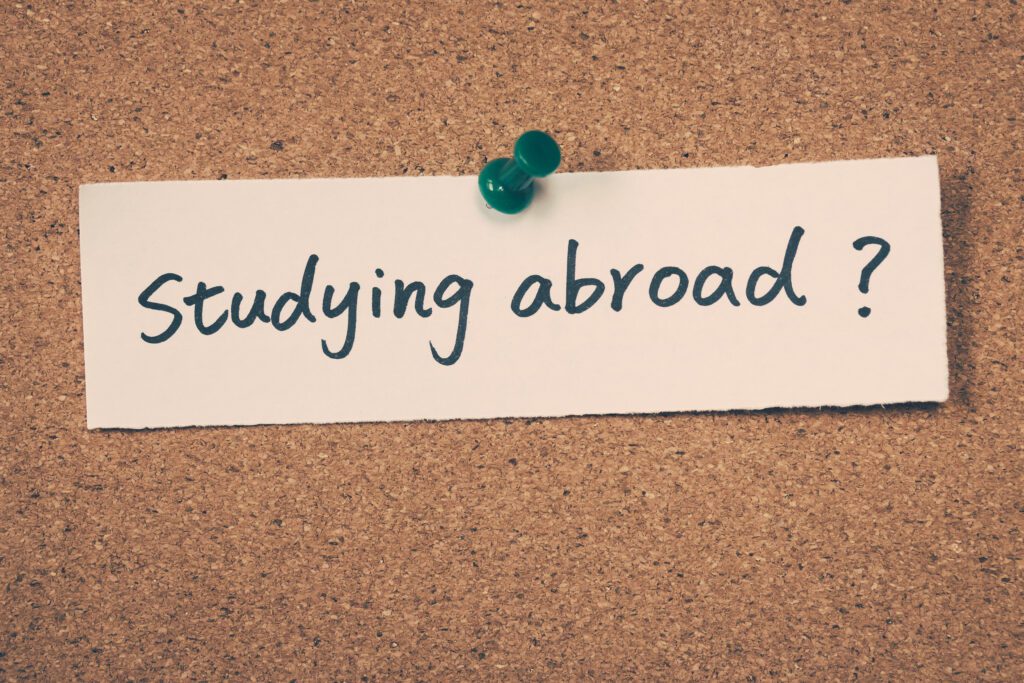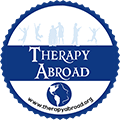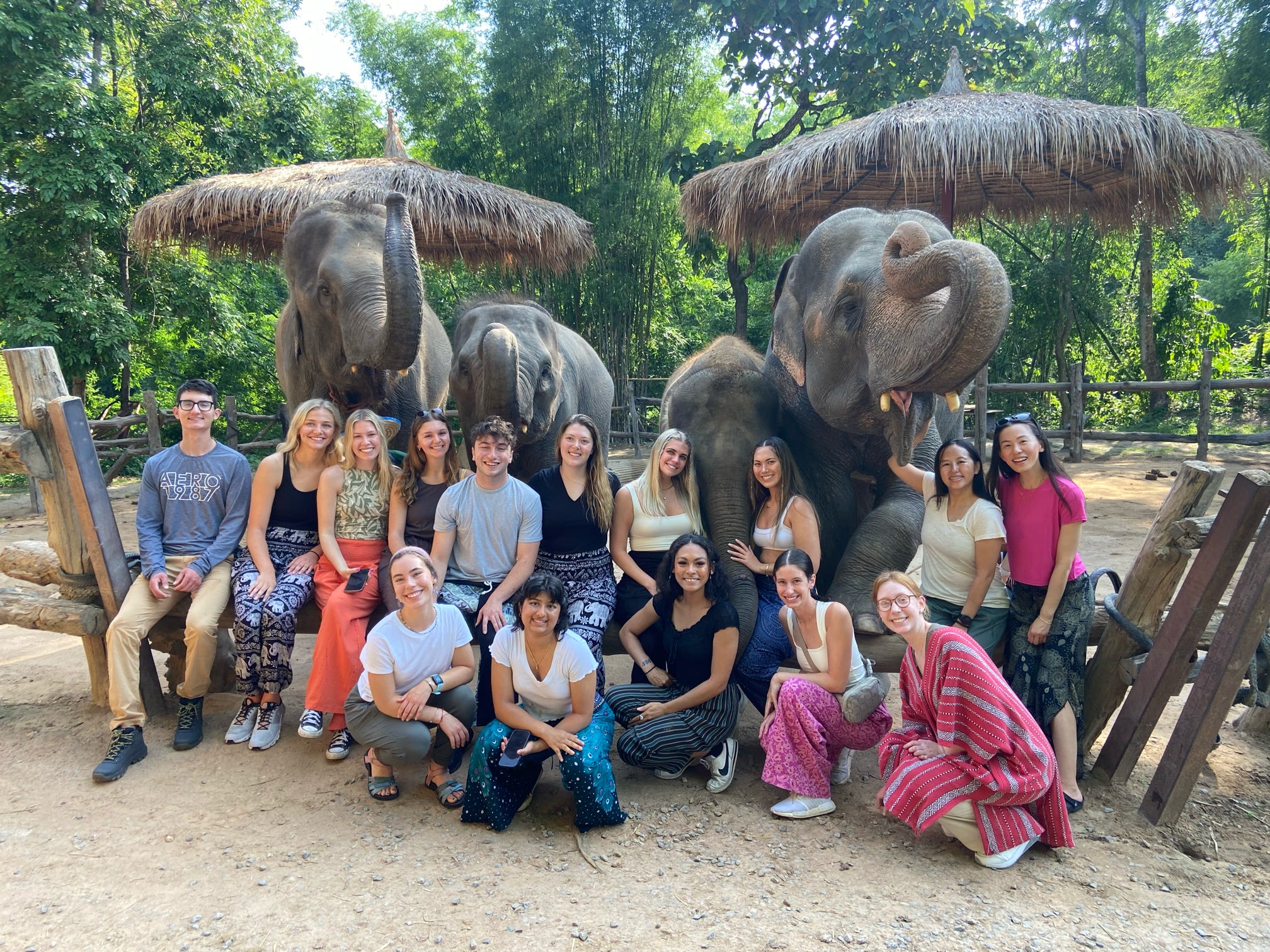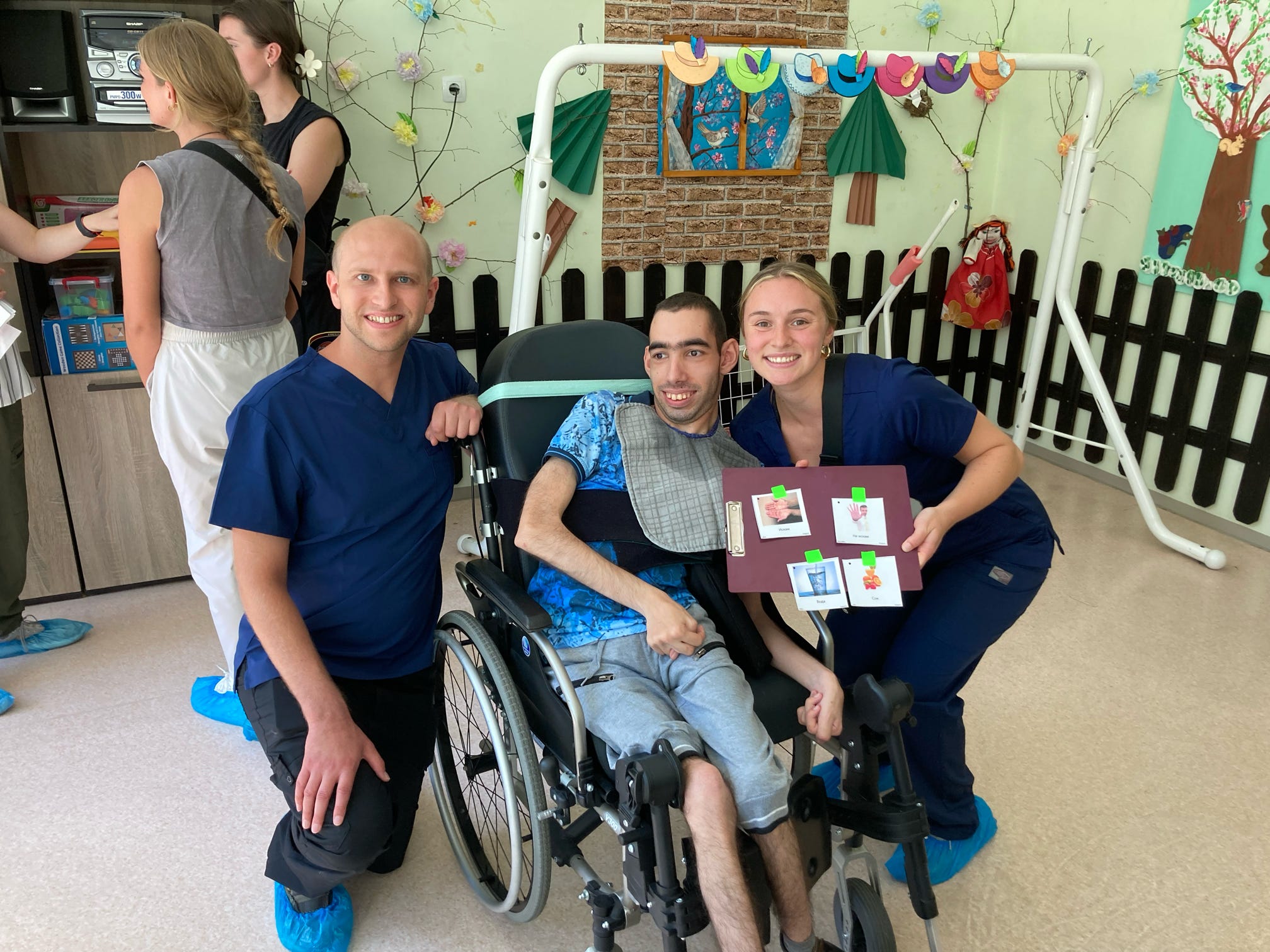Studying abroad may seem daunting at first, but it can be a life-changing experience. Going to college marks a new chapter in your life. Now is the perfect time to apply your newly developed knowledge cross-culturally within your field of study and experience even more personal growth. As scary as it may seem to leave your home and country and study in a new place for a while, the experience comes with many benefits. Admit it, the thought is pretty exciting.
Studying in a foreign country is often a once-in-a-lifetime opportunity that you shouldn’t miss out on. In this article we’ll walk you through eight exciting benefits of studying abroad. More specifically, it’s focused on how those interested in becoming a physical therapist (PT) or occupational therapist (OT) will gain valuable experience that will translate into skills as well as providing opportunity to serve!
 As cliche as it sounds, studying abroad allows you to broaden your horizons and see more of the world safely and with a group just as passionate as you are. You get to witness new sights, customs, foods, environments, and ways of life that you would never be able to fully immerse in, not even in an international course. There is only so much you can learn from the books and videos.
While you might have visited other countries for leisure, you probably felt like you didn’t have enough time to fully absorb the differences in culture and truly explore, immersing yourself into the surroundings and local customs. If you’re studying in the country, you have lots more chances to do exactly that. And even while you are in class or during class activities, it’s still a different experience altogether since you get to see what life’s like for the locals.
As cliche as it sounds, studying abroad allows you to broaden your horizons and see more of the world safely and with a group just as passionate as you are. You get to witness new sights, customs, foods, environments, and ways of life that you would never be able to fully immerse in, not even in an international course. There is only so much you can learn from the books and videos.
While you might have visited other countries for leisure, you probably felt like you didn’t have enough time to fully absorb the differences in culture and truly explore, immersing yourself into the surroundings and local customs. If you’re studying in the country, you have lots more chances to do exactly that. And even while you are in class or during class activities, it’s still a different experience altogether since you get to see what life’s like for the locals.
 Unsurprisingly, enrolling in a study abroad program allows you to expand your skill set. While previous points have already touched on benefits such as speaking a new language and developing stronger cultural competence, there’s so much you can gain from the experience.
For fields like Physical Therapy or Occupational Therapy, you will be more prepared for your career. When it comes to healthcare, immersion and hands-on experience are the best ways to develop beyond basic skills by allowing you to experience unique cases that may not have been available in the classroom or clinical settings. By studying abroad, you gain a wide new range of hard and soft skills that can make you more competent in your field, therefore making you the best candidate for graduate programs and competitive employment opportunities. What do we mean by hard and soft skills?
Unsurprisingly, enrolling in a study abroad program allows you to expand your skill set. While previous points have already touched on benefits such as speaking a new language and developing stronger cultural competence, there’s so much you can gain from the experience.
For fields like Physical Therapy or Occupational Therapy, you will be more prepared for your career. When it comes to healthcare, immersion and hands-on experience are the best ways to develop beyond basic skills by allowing you to experience unique cases that may not have been available in the classroom or clinical settings. By studying abroad, you gain a wide new range of hard and soft skills that can make you more competent in your field, therefore making you the best candidate for graduate programs and competitive employment opportunities. What do we mean by hard and soft skills?
 Another major advantage of studying abroad is the opportunity to meet people from different backgrounds and build lasting relationships. Aside from widening your knowledge and gaining a broader perspective, you also get the chance to make lifelong friends on your journey.
Depending on your level of comfort while meeting new people, this may not seem as exciting on day one, but you will see and feel more comfortable as you spend more time with your classmates. If you’re feeling scared about being the odd one out, you don’t have to! Many times, you simply need to share with the other international students who are also likely in the same boat as you. So you can help each other succeed and enjoy the experience.
Whether your program lasts days, weeks, or months, you get to live and study in a new place. This gives you the chance to build personal and professional connections, which will provide value as you move along your career. Now that the Internet is extremely accessible, you’ll be able to stay in touch with your newfound friends and colleagues long after you return home.
For a PT or OT study abroad program, these interactions will be invaluable. They’ll give you insight into what it’s like to be a healthcare professional. And this is important because you’ll always be working with a diverse population of people in a clinical setting. Thus, building relationships early on can go a long way once you start practicing your field of study.
Another major advantage of studying abroad is the opportunity to meet people from different backgrounds and build lasting relationships. Aside from widening your knowledge and gaining a broader perspective, you also get the chance to make lifelong friends on your journey.
Depending on your level of comfort while meeting new people, this may not seem as exciting on day one, but you will see and feel more comfortable as you spend more time with your classmates. If you’re feeling scared about being the odd one out, you don’t have to! Many times, you simply need to share with the other international students who are also likely in the same boat as you. So you can help each other succeed and enjoy the experience.
Whether your program lasts days, weeks, or months, you get to live and study in a new place. This gives you the chance to build personal and professional connections, which will provide value as you move along your career. Now that the Internet is extremely accessible, you’ll be able to stay in touch with your newfound friends and colleagues long after you return home.
For a PT or OT study abroad program, these interactions will be invaluable. They’ll give you insight into what it’s like to be a healthcare professional. And this is important because you’ll always be working with a diverse population of people in a clinical setting. Thus, building relationships early on can go a long way once you start practicing your field of study.
 If the reasons above have you convinced about the benefits of studying abroad for your PT or OT career, we’ve got the perfect program for you. Therapy Abroad offers a carefully-crafted PT and OT program designed to give you hands-on experience and see how actual professionals work in a cross-cultural setting.
To learn more about the program, you can contact us at 949-423-6165 or send us an inquiry on our website. Don’t miss out on this opportunity to gain new knowledge and skills that you won’t find in the classroom!
If the reasons above have you convinced about the benefits of studying abroad for your PT or OT career, we’ve got the perfect program for you. Therapy Abroad offers a carefully-crafted PT and OT program designed to give you hands-on experience and see how actual professionals work in a cross-cultural setting.
To learn more about the program, you can contact us at 949-423-6165 or send us an inquiry on our website. Don’t miss out on this opportunity to gain new knowledge and skills that you won’t find in the classroom!
See the World
 As cliche as it sounds, studying abroad allows you to broaden your horizons and see more of the world safely and with a group just as passionate as you are. You get to witness new sights, customs, foods, environments, and ways of life that you would never be able to fully immerse in, not even in an international course. There is only so much you can learn from the books and videos.
While you might have visited other countries for leisure, you probably felt like you didn’t have enough time to fully absorb the differences in culture and truly explore, immersing yourself into the surroundings and local customs. If you’re studying in the country, you have lots more chances to do exactly that. And even while you are in class or during class activities, it’s still a different experience altogether since you get to see what life’s like for the locals.
As cliche as it sounds, studying abroad allows you to broaden your horizons and see more of the world safely and with a group just as passionate as you are. You get to witness new sights, customs, foods, environments, and ways of life that you would never be able to fully immerse in, not even in an international course. There is only so much you can learn from the books and videos.
While you might have visited other countries for leisure, you probably felt like you didn’t have enough time to fully absorb the differences in culture and truly explore, immersing yourself into the surroundings and local customs. If you’re studying in the country, you have lots more chances to do exactly that. And even while you are in class or during class activities, it’s still a different experience altogether since you get to see what life’s like for the locals.
Learn a New Language
If you’re trying to build your foreign language skills, there’s no better way to do this than by exposing yourself to people who speak it as their native language. While there’s always the option to find online resources or take classes, it’s still more effective to study a new language while abroad. During that time you’ll be completely immersed in the language. So you get to learn from every interaction and gain first hand understanding of even the smallest details. Many times, you only learn textbook information in the classroom, for example, the english language is pretty complicated, Americans have a spoken language that does not always follow the rules. But by seeing and hearing the language every day, you get to pick up colloquialisms, slang, and other common phrases that people often use. As a PT or an OT professional, it is imperative that you are able to communicate, not only to articulate instruction, but to also understand what that patient is trying to share with you during your work together. Aside from understanding the language’s native culture, this helps you learn the right tone, inflection, choice of words, and other important things. Many times, these are hard to teach since they come naturally to a native speaker. Thus, exposing yourself to the language for an extended time allows you to adopt these mannerisms into your language skills.Increase Cross-Cultural Competence
If you have ever moved homes or transferred schools, you probably felt a culture shock from the sudden change in environment. This is completely normal, and it will be even stronger apparent the moment you step foot in a foreign country to study. Your experience will not be the same as when traveling since you now get to experience life as a local instead of just a tourist. You will immerse yourself in a new culture—and this is one of the most significant advantages of studying abroad. As an international student, you get to meet and interact with different people, try local delicacies, visit new sights, make new friends that often last a lifetime as you engage in your profession. Overall, you become more aware of the local culture and way of life. Through this enriching experience, you ultimately increase your cross-cultural competence. This refers to your ability to comprehend and engage with people from different cultures. Generally, this skill is valuable for anyone, regardless of their career plans. But it’s especially important for aspiring healthcare professionals since cultural barriers can affect how your patient responds to communication and how well you can treat your patients.Experience New Education Styles
Different countries and institutions have their own education styles. So by studying abroad, you can experience expanded learning opportunities. This helps you develop adaptability within your learning ability and eventually this will be translated into problem solving with your patients by helping you see different ways to approach a need. Just as your professors have done with you during your educational experience. For example, if you’re used to a more authoritative teaching style with long lectures and presentations, you can try looking for a more hands-on program like Thailand’s Pre-PT College Prep Program in Thailand. When learning for these healthcare fields, it’s important to find opportunities for this hands-on experience since this allows you to apply your theoretical knowledge and test your skills. Even if you aren’t in graduate school yet, you can begin planning to attend relevant programs with Therapy Abroad, whose programs provide a safe overseas education experience designed to expand your ability to provide the best care possible. By doing this, you get exposed to real-life settings earlier on, which will be beneficial as a candidate for a PT or OT master’s degree program. It’s often hard to gain this type of knowledge and skill in a classroom, so a student travel program will be the perfect way to gear you up for your future studies and career.Expand Your Skill Set
 Unsurprisingly, enrolling in a study abroad program allows you to expand your skill set. While previous points have already touched on benefits such as speaking a new language and developing stronger cultural competence, there’s so much you can gain from the experience.
For fields like Physical Therapy or Occupational Therapy, you will be more prepared for your career. When it comes to healthcare, immersion and hands-on experience are the best ways to develop beyond basic skills by allowing you to experience unique cases that may not have been available in the classroom or clinical settings. By studying abroad, you gain a wide new range of hard and soft skills that can make you more competent in your field, therefore making you the best candidate for graduate programs and competitive employment opportunities. What do we mean by hard and soft skills?
Unsurprisingly, enrolling in a study abroad program allows you to expand your skill set. While previous points have already touched on benefits such as speaking a new language and developing stronger cultural competence, there’s so much you can gain from the experience.
For fields like Physical Therapy or Occupational Therapy, you will be more prepared for your career. When it comes to healthcare, immersion and hands-on experience are the best ways to develop beyond basic skills by allowing you to experience unique cases that may not have been available in the classroom or clinical settings. By studying abroad, you gain a wide new range of hard and soft skills that can make you more competent in your field, therefore making you the best candidate for graduate programs and competitive employment opportunities. What do we mean by hard and soft skills?
- Hard Skills. These skills are developed directly related to your field of study such as safe exercise techniques or ways to lift a patient from a chair. With the international learning experience you can deepen your knowledge and apply your skills with patients with additional barriers to your care such as cultural and language. This will allow you to improve your verbal and written communication skills, and develop physical stamina—all which are helpful for a future PT or OT career.
- Soft Skills. These skills are developed over time with experience. You can also expect to pick up soft skills that will ensure you are a successful practitioner which is important in the healthcare arena. Some common soft skills you’ll learn from your international experience include adaptability, self-confidence, problem-solving, independence, leadership, and a sense of responsibility.
Elevate Your Credentials
One of the major educational benefits of studying abroad is its impact on future opportunities, whether future studies or jobs. By highlighting your experience as an international student on your resume or CV, you immediately elevate your credentials and gain an edge. If you are a bachelor’s student and planning to go to graduate school for a PT or OT program, you can increase your chances of getting accepted. Schools recognize the value in studying abroad as it shows initiative and drive for excellence. With this experience you gain more international connections, fresh perspectives and a broader toolbox of techniques, and cultural awareness. These can all boost your application and show your commitment to your chosen field. The same idea applies for the job market. Based on a survey conducted by Hostelworld on 1,006 hiring decision-makers in the US:- 23.3% said they would choose candidates with study abroad experience, if given the choice between two hires.
- 41% have considered offering higher salaries to job applicants with an international education background.
Build New Relationships
 Another major advantage of studying abroad is the opportunity to meet people from different backgrounds and build lasting relationships. Aside from widening your knowledge and gaining a broader perspective, you also get the chance to make lifelong friends on your journey.
Depending on your level of comfort while meeting new people, this may not seem as exciting on day one, but you will see and feel more comfortable as you spend more time with your classmates. If you’re feeling scared about being the odd one out, you don’t have to! Many times, you simply need to share with the other international students who are also likely in the same boat as you. So you can help each other succeed and enjoy the experience.
Whether your program lasts days, weeks, or months, you get to live and study in a new place. This gives you the chance to build personal and professional connections, which will provide value as you move along your career. Now that the Internet is extremely accessible, you’ll be able to stay in touch with your newfound friends and colleagues long after you return home.
For a PT or OT study abroad program, these interactions will be invaluable. They’ll give you insight into what it’s like to be a healthcare professional. And this is important because you’ll always be working with a diverse population of people in a clinical setting. Thus, building relationships early on can go a long way once you start practicing your field of study.
Another major advantage of studying abroad is the opportunity to meet people from different backgrounds and build lasting relationships. Aside from widening your knowledge and gaining a broader perspective, you also get the chance to make lifelong friends on your journey.
Depending on your level of comfort while meeting new people, this may not seem as exciting on day one, but you will see and feel more comfortable as you spend more time with your classmates. If you’re feeling scared about being the odd one out, you don’t have to! Many times, you simply need to share with the other international students who are also likely in the same boat as you. So you can help each other succeed and enjoy the experience.
Whether your program lasts days, weeks, or months, you get to live and study in a new place. This gives you the chance to build personal and professional connections, which will provide value as you move along your career. Now that the Internet is extremely accessible, you’ll be able to stay in touch with your newfound friends and colleagues long after you return home.
For a PT or OT study abroad program, these interactions will be invaluable. They’ll give you insight into what it’s like to be a healthcare professional. And this is important because you’ll always be working with a diverse population of people in a clinical setting. Thus, building relationships early on can go a long way once you start practicing your field of study.
Foster Personal Development
Studying abroad is not easy and should be entered into as the important aspect it will have in your future career. It’s a bold decision that entails living and adapting to a new place for a while. In most cases, it requires moving out of your comfort zone. It can be scary to do something completely new from what you’re used to. But it’s usually these experiences that end up being most enriching—and that’s exactly what living and studying abroad offers. There are so many ways in which studying abroad allows for personal growth, one of which is through increased self-awareness. When exposed to a new culture, you get to open yourself to new perspectives and understand what’s important to you. At times, you may challenge pre-existing values and beliefs and question whether you have biases that you should reassess. Aside from this, study abroad experiences can also serve as a form of discovery. If you stay in your comfort zone, you limit yourself to a certain routine that can feel monotonous at one point. When this happens, going abroad to study helps you break out of the routine, allowing you to discover new things about yourself. Many times, you might be surprised at what you’re able to do while you study abroad. Perhaps you thought that you’d be too shy to interact, but you never know—you might be the one initiating conversations when you meet new people! Or in other cases, you might find new interests and passions that stick with you even after you return home.Are You Interested in Studying Abroad With Us?
 If the reasons above have you convinced about the benefits of studying abroad for your PT or OT career, we’ve got the perfect program for you. Therapy Abroad offers a carefully-crafted PT and OT program designed to give you hands-on experience and see how actual professionals work in a cross-cultural setting.
To learn more about the program, you can contact us at 949-423-6165 or send us an inquiry on our website. Don’t miss out on this opportunity to gain new knowledge and skills that you won’t find in the classroom!
If the reasons above have you convinced about the benefits of studying abroad for your PT or OT career, we’ve got the perfect program for you. Therapy Abroad offers a carefully-crafted PT and OT program designed to give you hands-on experience and see how actual professionals work in a cross-cultural setting.
To learn more about the program, you can contact us at 949-423-6165 or send us an inquiry on our website. Don’t miss out on this opportunity to gain new knowledge and skills that you won’t find in the classroom! 

 Share
Share
 Tweet
Tweet
 LinkedIn
LinkedIn
 Pin
Pin
 Email
Email





